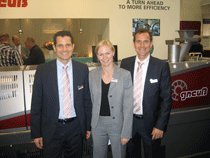The manufacturer of single-screw extrusion equipment and screen changers, among other equipment, claims it is the first extruder manufacturer to receive an unrestricted Non Objection Letter from the U.S. Food & Drug Administration (FDA) for its complete PET recycling system. The company already in 2010 received a Non Objection Letter from the FDA for a complete PET recycling system including a solid state polymerization (SSP) system.
May 6, 2011
The manufacturer of single-screw extrusion equipment and screen changers, among other equipment, claims it is the first extruder manufacturer to receive an unrestricted Non Objection Letter from the U.S. Food & Drug Administration (FDA) for its complete PET recycling system. The company already in 2010 received a Non Objection Letter from the FDA for a complete PET recycling system including a solid state polymerization (SSP) system.
|
Pictured at the K show last fall standing before one of their company's MRS extruders are (from left) Stephan, Monika and Daniel Gneuß. The company unveiled the MRS extruder at the same show in 2007. |
Now, Gneuß (Bad Oeynhausen, Germany and Matthews, NC) has received an unrestricted Non Objection Letter (NOL) for food packaging products of all types (classes C - G) for its extrusion process. This means users of the system can do without any treatment of PET before or after extrusion.
Explains managing director Stephan Gneuss, "The FDA Non Objection Letter for the processing of up to 100 % PET bottle flakes only using an extruder - without any pre- or post- extrusion treatment of the material - is a unique selling point." The manufacturer says it has sold more than 20 of these extruders since the market launch in late 2007.
This new FDA NOL allows users of the MRS extruder, its devolatilization system and the rotary melt filtration system to process up to 100 % unwashed PET bottle flakes for use in food contact containers. No treatment of the material before or after it is processed on the extruder is necessary: no drying, no drying under vacuum, no crystallizing and so forth.
The company says that the MRS extruder's devolatilization performance is the result of an extremely large polymer melt surface area in the multiple rotation section of the extruder, together with a rapid melt exchange and optimized venting. Devolatization with this extruder does not lead to a substantial drop in the melt's intrinsic viscosity.
About the Author(s)
You May Also Like



